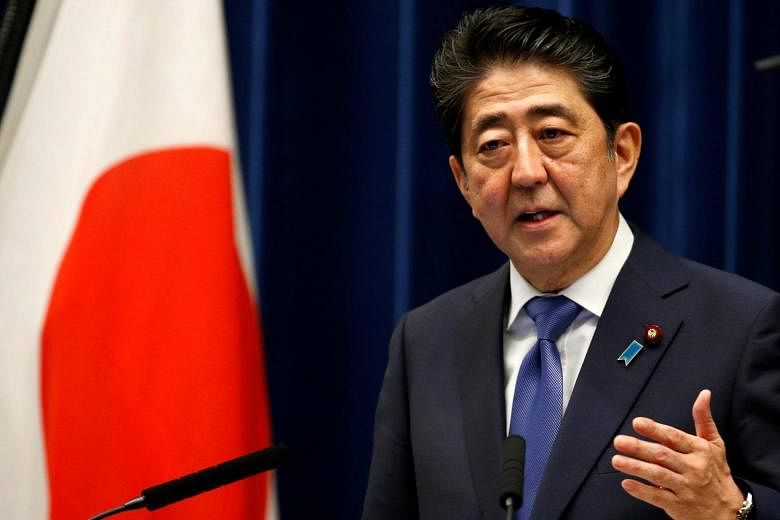TOKYO - Japanese Prime Minister Shinzo Abe on Monday (Sept 25) said he will dissolve the Lower House on Thursday (Sept 28) for a snap election.
Speaking at a news conference, Mr Abe said: "North Korea cannot deter our efforts towards democracy", in response to opposition criticism of a political vacuum amid North Korea's nuclear threat. He pledged to step up pressure if Pyongyang fails to stop its missile and nuclear weapons development.
The prime minister did not mention when the snap election will be held, but earlier reports had said it would be on Oct 22.
Polls at the weekend show that the Liberal Democratic Party (LDP) is expected to win convincingly, despite two-thirds of voters disagreeing with the plan to call a snap election at this stage. The election gambit comes as Mr Abe's approval ratings are on the mend after what has been a bruising year of political scandals that sunk his ratings to below 30 per cent - a level some analysts have termed the "death zone".
Mr Abe was himself implicated in two cronyism scandals, while the Defence Ministry, led by his erstwhile protege Tomomi Inada, had been mired in a cover-up saga. He said on Monday: "It's going to be a very very difficult election for us. I am ready for that."
The vote, which comes more than one year ahead of schedule, is meant to be a poll on the use of the increased revenue from a scheduled consumption tax hike to 10 per cent, from 8 per cent, in October 2019 to improve social welfare. The original intent, for much of the increased revenue, had been to pay off government debts.
He said on Monday that his government will draw up a new economic package by the end of the year, powered by productivity reforms and education support including free higher education.
Free tertiary education is one of the proposed changes to the pacifist Constitution that was drawn up by the United States after World War II, alongside a change to the war-renouncing Article 9 to include a mention of the role of its military Self-Defence Force.
But the proposed use of the increased funds has been met with dissent even within Mr Abe's ruling LDP, as some believe the government needs to be responsible in its goal of realising fiscal health. Mr Abe is said to have shut out the party's policy chief Fumio Kishida, a former foreign minister who belongs to a different party faction, in coming up with the policy.
A LDP lawmaker from a party faction led by Mr Kishida was quoted in the right-leaning Yomiuri Shimbun as saying: "The Abe-dominant method that was once shaken by lower Cabinet support in opinion polls has now revived."
At the same time as his press conference, a group of more than 100 protesters gathered outside the Prime Minister's Office chanting such slogans as "Abe Resign". They came bearing placards accusing Mr Abe of evasiveness in the Kake Educational Institute cronyism scandal. Mr Abe was alleged to have pulled strings to help his close friend Kotaro Kake, who runs the institute, secure a government contract to open a new veterinary school.
Analysts have attributed the rebound in Mr Abe's ratings to North Korea's belligerence, which has created a flight for safety and stability provided by Mr Abe, who is seen as a hawkish prime minister with an ambition to revise the pacifist post-war Constitution.
What remains fresh in the minds of voters was the revolving door of six prime ministers between 2006 and 2012 until Mr Abe took office on Dec 26, 2012. He is now the third longest-serving leader in post-war Japan.
Also having helped are his moves to address the controversies swirling around him, whether by replacing gaffe-prone ministers in a Cabinet reshuffle two months ago, or his vow to look into administrative procedures that have created perceptions of an opaque government.
However, the opposition - led by the Democratic Party (DP) - has accused the LDP of attempting to evade further grilling into his alleged role in the cronyism scandals. Mr Abe is said to be planning to dissolve the Diet the moment it convenes for a scheduled session on Thursday, without giving a policy speech.
Hours before Mr Abe announced his plan on Monday, Tokyo Governor Yuriko Koike told a news conference that she was fronting and leading a new national political party "Kibou no To" (Party of Hope).
Ms Koike, a charismatic renegade LDP lawmaker who was elected governor as an independent, is often touted as a potential future prime minister.
Under her leadership, the local Tomin First no Kai (Tokyoites First) party hammered the LDP in Tokyo Metropolitan Assembly polls in July this year. Together with its allies, it clinched a majority of 79 seats in the 127-seat assembly. The LDP, which fielded 60 candidates and had 57 members in the former assembly, won only 23 seats.
Her direct involvement came as a surprise, as she was previously said to be playing a supporting role to her close aide Masaru Wakasa in his setting up of the party.
Ms Koike, who intends to concurrently remain as Tokyo Governor, had said at a news conference: "I'm launching a new party and I want to be directly involved in it."
"Can we continue letting the LDP handle politics?" asked Ms Koike, who had previously criticised Mr Abe's trademark economic policy mix Abenomics as having "failed to produce a sense of hope".
Mr Abe said on Monday that "Kibou", or hope, is a "very nice word" as he sought to highlight Ms Koike's LDP past. Ms Koike was defence minister during Mr Abe's brief first term of power from 2006 to 2007
"On the issue of national security, our concepts are the same. Maybe she has a different direction in terms of policies, but our basic concept is the same in terms of defence.


